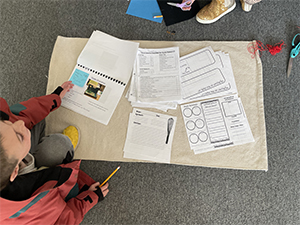“We were nervous to present this plan because we have some teachers who have only ever taught Montessori and it’s not in their wheelhouse to do this kind of lesson planning, but they loved it… It was really great to see all of our teachers jumping in and looking at the standards and figuring out how to use Bloom’s to push their students’ thinking. It was very powerful.”
—Darcy Walters, Director of Teaching & Learning
Striving to Increase Student Cognitive Lift by Moving up on Bloom’s Taxonomy Scale
Established in 2016, Steamboat Montessori serves students in PK-6th grade in multi-age classrooms and is growing to include 7th and 8th grade over the next two years. While it lacks diversity both in staff and students, Jennifer Mac, a Lead Teacher, explains that, “we really are working hard to reach our special ed students as well as our GT students and the children who fall in between.”
Benchmark data showed that students were doing cognitive lift at least 75% of the time in 50% of their observations, but looking at Bloom’s Taxonomy, teachers were not posing higher level questions or tasks to students.
Their goal was to raise the rigor and increase student’s cognitive lift and engagement by strategically planning objectives using Bloom’s framework and creating exemplars for evidence of learning. However, because writing skills are not built into the Montessori curriculum, their teachers lacked objective. By developing those skills and implementing this strategy, teachers will be required to be strategic and intentional with their Montessori-based planning, ensuring their objectives are measurable, rigorous, specific and standards-aligned.
Darcy Walters, Director of Teaching and Learning, explains that, ultimately, Steamboat Montessori hopes that in 75% of classrooms, teacher lift will shift to 25% or below as evidenced by walk-throughs and in four out of five classrooms In addition, teachers will move between “understanding and applying” and “evaluating” and above in Bloom’s Taxonomy as evidenced by both walk throughs and tasks that students are completing.
Before the school year began, lead teachers were provided targeted professional development and staff created both unit and lesson plan templates with all the pieces they wanted teachers to be thinking about, ensuring strong objectives are present in teacher planning. “We were nervous to present this plan because we have some teachers who have only ever taught Montessori and it’s not in their wheelhouse to do this kind of lesson planning, but they loved it… It was really great to see all of our teachers jumping in and looking at the standards and figuring out how to use Bloom’s to push their students’ thinking.” said Darcy. “It was very powerful.”
While the school originally wanted to jump into a student enrichment plan to increase student engagement with extracurriculars, they realized they had to slow down and truly focus on writing strong objectives and lesson plans. Teachers were provided eight Friday afternoons in the first semester to delve into this work with coaching. Jennifer revealed, “At first, there was a little bit of controversy because we work in a classroom with a lead teacher and an assistant and the assistants were running the classroom during that time without a lead teacher in there which created some concerns. But once we got together and were able to set that expectation of planning to make our instruction better, we overcame that hurdle pretty quickly.”
The school has plans for community engagement that will support teachers, students and their overall goal as well. In the second semester, Steamboat Montessori will build on their initiative, creating a school-wide unit plan that includes enrichment activities taught by community professionals from art and music to Crossfit. They will utilize Bloom's Taxonomy and the framework they have created to guide these individuals in their instruction as well. Says Jennifer, “that hurdle or thought process of not having a lead teacher in the classroom will go away soon because now we’ll be leaning on the community to help us implement our strategy, which will be great.”
Observations — a big part of the Montessori philosophy — and feedback cycles throughout the year will provide teachers with needed support. “Speaking as a teacher,” says Jennifer, “coming together with my grade level partner, we have just created wonderful units together. We've been able to integrate our instruction and use that higher level questioning within our instruction … It's been very valuable. And as far as engagement is concerned, I think the students have benefited greatly because they seem excited about rotating among us to have their lessons.”


